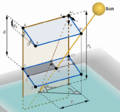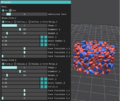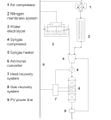J.M.Pearce (talk | contribs) m (→See also) |
(Set shorter title-tag for SEO purposes) |
||
| (22 intermediate revisions by 9 users not shown) | |||
| Line 1: | Line 1: | ||
{{Solar menu}} | |||
[[File: Aquapv.jpg|thumb]] | |||
{{Source data | |||
| type = Paper | |||
| cite-as = Adam M. Pringle, R.M. Handler, J.M. Pearce. [http://www.sciencedirect.com/science/article/pii/S1364032117308304 Aquavoltaics: Synergies for dual use of water area for solar photovoltaic electricity generation and aquaculture]. ''Renewable and Sustainable Energy Reviews'' 80, (2017), pp. 572–584. https://doi.org/10.1016/j.rser.2017.05.191 [https://www.academia.edu/33327275/Aquavoltaics_Synergies_for_Dual_Use_of_Water_Area_for_Solar_Photovoltaic_Electricity_Generation_and_Aquaculture open access] | |||
}} | |||
{{MOST}} | {{MOST}} | ||
Bodies of water provide essentials for both human society as well as natural ecosystems. To expand the services this water provides, hybrid food-energy-water systems can be designed. This paper reviews the fields of floatovoltaic (FV) technology (water deployed solar photovoltaic systems) and aquaculture (farming of aquatic organisms) to investigate the potential of hybrid floatovoltaic-aquaculture synergistic applications for improving food-energy-water nexus sustainability. The primary motivation for combining electrical energy generation with aquaculture is to promote the dual use of water, which has historically high unused potential. Recent advances in FV technology using both pontoon and thin film structures provides significant flexibility in deployment in a range of water systems. Solar generated electricity provides off-grid aquaculture potential. In addition, several other symbiotic relationships are considered including an increase in power conversion efficiency due to the cooling and cleaning of module surfaces, a reduction in water surface evaporation rates, ecosystem redevelopment, and improved fish growth rates through integrated designs using FV-powered pumps to control oxygenation levels as well as LED lighting. The potential for a solar photovoltaic-aquaculture or aquavoltaic ecology was found to be promising. If a U.S. national average value of solar flux is used then current aquaculture surface areas in use, if incorporated with appropriate solar technology could account for 10.3% of total U.S. energy consumption as of 2016. | |||
* Used: [[Solar floatovoltaics lit review]] and [[Dual use of water for PV farms and aquaculture literature review]] | |||
{{Pearce publications notice}} | |||
== | == See also == | ||
{{Pearce-agrivoltaics}} | |||
* [[An open source simulation of photovoltaic yield with r.sun over large regions]] | * [[An open source simulation of photovoltaic yield with r.sun over large regions]] | ||
* | * [https://doi.org/10.1111/are.15665 Effects of floating photovoltaic systems on water quality of aquaculture ponds] - "This study investigated the water quality of aquaculture ponds with and without simulated FPV systems ('''40% surface area shading''') at three sites: Chupei, Lukang and Cigu. Results indicated '''the FPV-covered ponds exhibited lower mean values in biochemical oxygen demand and plankton biomass but higher oxidation–reduction potential relative to the control ponds'''. '''The FPV-covered ponds exhibited lower pH, water temperature and level of dissolved oxygen relative to the control ponds''' in Chupei and Lukang. The results suggested that the FPV shading effect potentially reduced phytoplankton growth. '''All FPV-covered ponds exhibited 1.1, 1.2 and 1.4 times greater yields in giant freshwater prawn, tilapia and milkfish without any effect on the growth of cultured species.''' | ||
== In the News == | |||
# [https://www.nbcnews.com/mach/science/floating-solar-farms-how-floatovoltaics-could-provide-power-without-taking-ncna969091 Floating solar farms: How 'floatovoltaics' could provide power without taking up valuable real estate] - NBC News 787 | |||
# [https://theusbreakingnews.com/why-solar-farms-of-the-future-may-float-on-water/ Why solar farms of the future may float on water ]- The US Breaking News, [https://www.lawbreakingnews.com/2019/02/why-solar-farms-of-the-future-may-float-on-water/ Law Breaking News] | |||
# [http://www.sneakpeekreports.com/article/floating-solar-farms-how-floatovoltaics-could-provide-power-without-taking-up-valuable-real-estate?aid=DrnkrLmYVRFpScJ9FPoC Floating solar farms: How 'floatovoltaics' could provide power without taking up valuable real estate ] - Sneak Peak Reports | |||
# [http://web.archive.org/web/20190829214122/https://weather.com/forecast-change/marketing/news/2019-08-29-floating-solar-panels-helping-mining-company-save-water Floating Solar Panels Are Helping This Mining Company Save Water] The Weather Channel 236 | |||
# [https://www.worldenergytrade.com/index.php/m-news-alternative-energy/96-news-energia-solar/4432-la-mina-los-bronces-de-chile-instala-innovadores-paneles-solares-flotantes La mina Los Bronces de Chile instala innovadores paneles solares flotantes ] World Energy Trade (Spanish) 4k | |||
# [https://avatarenergia.com/tag/mina-los-bronces/ Mina Los Bronces instala paneles solares flotantes ] Avatar Energia | |||
# [https://weather.com/forecast-change/news/2019-08-29-floating-solar-panels-helping-mining-company-save-water Floating Solar Panels Are Helping This Mining Company Save Water] The Weather Channel 237 | |||
{{Solar | {{Page data | ||
| title-tag = Aquavoltaics: Dual Use of Water for PV & Aquaculture | |||
| keywords = MOST completed projects and publications, Solar power, Solar energy, Photovoltaics, sustainable development, Floatovoltaics, Aquaculture, Food energy water nexus, Aquavoltaics, Renewable energy, energy | |||
| sdg = SDG07 Affordable and clean energy | |||
| authors = Adam M. Pringle, R.M. Handler, User:J.M.Pearce | |||
}} | |||
[[Category:MOST completed projects and publications]] | [[Category:MOST completed projects and publications]] | ||
[[Category: | [[Category:Aquaculture]] | ||
[[Category: | [[Category:Renewable energy]] | ||
[[Category: | [[Category:Energy]] | ||
Latest revision as of 16:02, 23 February 2024
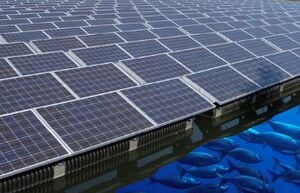
Bodies of water provide essentials for both human society as well as natural ecosystems. To expand the services this water provides, hybrid food-energy-water systems can be designed. This paper reviews the fields of floatovoltaic (FV) technology (water deployed solar photovoltaic systems) and aquaculture (farming of aquatic organisms) to investigate the potential of hybrid floatovoltaic-aquaculture synergistic applications for improving food-energy-water nexus sustainability. The primary motivation for combining electrical energy generation with aquaculture is to promote the dual use of water, which has historically high unused potential. Recent advances in FV technology using both pontoon and thin film structures provides significant flexibility in deployment in a range of water systems. Solar generated electricity provides off-grid aquaculture potential. In addition, several other symbiotic relationships are considered including an increase in power conversion efficiency due to the cooling and cleaning of module surfaces, a reduction in water surface evaporation rates, ecosystem redevelopment, and improved fish growth rates through integrated designs using FV-powered pumps to control oxygenation levels as well as LED lighting. The potential for a solar photovoltaic-aquaculture or aquavoltaic ecology was found to be promising. If a U.S. national average value of solar flux is used then current aquaculture surface areas in use, if incorporated with appropriate solar technology could account for 10.3% of total U.S. energy consumption as of 2016.
- Used: Solar floatovoltaics lit review and Dual use of water for PV farms and aquaculture literature review
See also[edit | edit source]
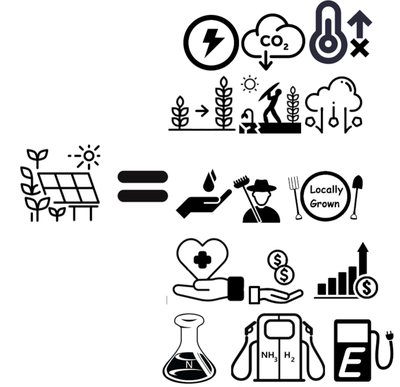
- Coal with Carbon Capture and Sequestration is not as Land Use Efficient as Solar Photovoltaic Technology for Climate Neutral Electricity Production
- Dual use of land for PV farms and agriculture literature review
- sheep
- Israeli white plastic reflectors
- A Farmer's Guide to Going Solar (NREL)
- German guidelines: https://www.ise.fraunhofer.de/content/dam/ise/en/documents/publications/studies/APV-Guideline.pdf
- 2021 review
- Miskin, C.K., Li, Y., Perna, A., Ellis, R.G., Grubbs, E.K., Bermel, P. and Agrawal, R., 2019. Sustainable co-production of food and solar power to relax land-use constraints. Nature Sustainability, 2(10), pp.972-980.
- Retrofitting solar parks for agrivoltaics
- Shading PV
- Alexis' talk at American Solar Grazing Association2021
In the News[edit source]
- Agrivoltaics: solar energy + better crops Climate and Nature
- Why solar power and farmers’ fields could be the perfect combination TVO
- Solar farms and sheep show the makings of a clean energy classic duo Business Renewables
- Agrivoltaics charge up St. Albert-area farms St Albert Gazette
- Sheep, solar and crops. How some Alberta farms are creating ideal growing conditions Western Wheel
- Sheep, solar and crops. How some Alberta farms create ideal growing conditions Voxpopuli
- Protein bars from recycled plastic bottles? An indoor farm on wheels? Western prof gets innovative with green tech Toronto Star
- 加拿大环保狂人回收塑料瓶制成蛋白棒 还有可移动室内农场!? Lahoo
- An open source simulation of photovoltaic yield with r.sun over large regions
- Effects of floating photovoltaic systems on water quality of aquaculture ponds - "This study investigated the water quality of aquaculture ponds with and without simulated FPV systems (40% surface area shading) at three sites: Chupei, Lukang and Cigu. Results indicated the FPV-covered ponds exhibited lower mean values in biochemical oxygen demand and plankton biomass but higher oxidation–reduction potential relative to the control ponds. The FPV-covered ponds exhibited lower pH, water temperature and level of dissolved oxygen relative to the control ponds in Chupei and Lukang. The results suggested that the FPV shading effect potentially reduced phytoplankton growth. All FPV-covered ponds exhibited 1.1, 1.2 and 1.4 times greater yields in giant freshwater prawn, tilapia and milkfish without any effect on the growth of cultured species.
In the News[edit | edit source]
- Floating solar farms: How 'floatovoltaics' could provide power without taking up valuable real estate - NBC News 787
- Why solar farms of the future may float on water - The US Breaking News, Law Breaking News
- Floating solar farms: How 'floatovoltaics' could provide power without taking up valuable real estate - Sneak Peak Reports
- Floating Solar Panels Are Helping This Mining Company Save Water The Weather Channel 236
- La mina Los Bronces de Chile instala innovadores paneles solares flotantes World Energy Trade (Spanish) 4k
- Mina Los Bronces instala paneles solares flotantes Avatar Energia
- Floating Solar Panels Are Helping This Mining Company Save Water The Weather Channel 237




















